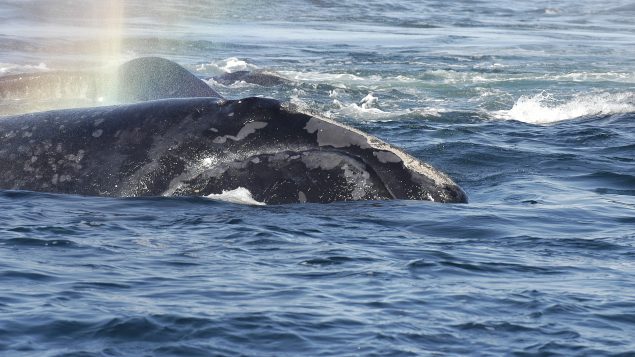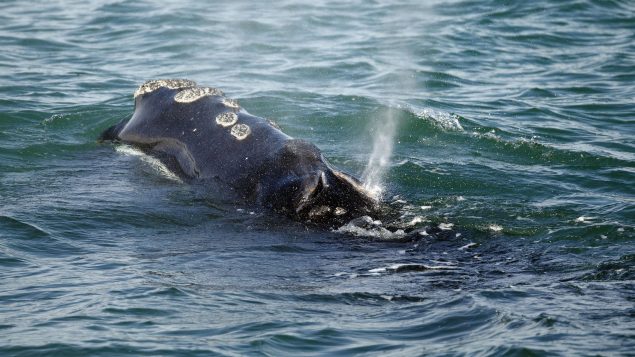As bad weather hampers efforts to help three North Atlantic whales entangled in fishing gear in the Gulf of St. Lawrence, a group of Canadian environmental and conservation groups is calling on the federal government to introduce additional measures to protect the highly endangered cetaceans.
Since June, officials have reported six deaths of right whales, including four breeding age females, in Canadian waters. Necropsies performed on the carcasses of these whales confirmed the cause of death for three whales as blunt force trauma consistent with ship strikes.
There are only about 400 North Atlantic right whales left and with fewer than 100 reproductive females the death of any right whale causes huge concern.
The deaths of giant marine mammals have prompted Ottawa to introduce several new measures designed to protect them, including further reduction of ship speeds in the area, increasing zones in which the speed restrictions will apply, increasing aerial surveillance and funding for initiatives to enhance marine mammal response.
- 6th North Atlantic right whale found dead
- Canada imposes ship speed limits after 5th endangered whale found dead
However, a joint statement by Oceana Canada, Ecology Action Centre, Sierra Club Canada Foundation, World Wildlife Fund Canada, International Fund for Animal Welfare and Humane Society International/Canada calls on Ottawa to expand the mandatory speed restriction zone for vessels to include the entire Gulf of St. Lawrence.
“The fatalities in 2019 may be on a similar trajectory to 2017, when 12 whales were found dead in Canadian waters,” the statement said. “Continuing along this path will be devastating to right whales’ chance of survival. No one wants to see the crisis continue and additional actions are necessary.”

Researchers at the the Anderson Cabot Center for Ocean Life at the New England Aquarium identified the fifth dead right whale as #3329. Her entanglement scars in Gulf of St. Lawrence. (Amy Knowlton, New England Aquarium/Canadian Whale Institute)
The statement also calls on the federal government to continue its massive aerial surveillance program and to strictly enforce speed restrictions for vessels by issuing maximum fines to those who break the speed limit and publish all convictions on the Transport Canada website.
According to recently released documents by the federal department of Fisheries and Oceans, whales in the buffer zone outside of the mandatory speed limit zone were at a potentially heightened risk because vessels increased their speeds before entering the slow down zone.
Transport Canada has reported 111 violations of existing speed restrictions, nine of which remain under review but so far no fines have been issued, the statement by the conservation groups said.

A 33-year-old adult male whale named Comet is seen on a photo taken on Sept. 13, 2009 in the Bay of Fundy. Comet, named so because of a long scar on his right side, was found dead Monday near New Brunswick’s Acadian Peninsula.
(Moira Brown/Anderson Cabot Center at the New England Aquarium)
In an emailed statement to Radio Canada International, officials at DFO said “the well-being of the endangered North Atlantic right whale population is of great concern to Canadians.”
The protection of the species is a top priority for the government, the statement said.
“We are committed to taking all necessary actions to help protect North Atlantic right whales from further harm, which includes continuing with our robust fisheries management measures in Atlantic Canada that were implemented for 2019, as well as the additional targeted measures DFO and Transport Canada announced on July 8,” the statement said.
The additional fisheries management measures include increasing the application of closures to fixed gear fisheries when a single whale is seen anywhere in the Gulf of St. Lawrence, increasing aerial surveillance, and moving forward with funding for initiatives to enhance marine mammal response, it added.
Transport Canada will also expand the current slowdown zone in shipping lanes north and south of Anticosti Island where vessels are required to slow to 10 knots, and further east when a North Atlantic right whale is spotted in that area.
A slowdown buffer zone will also be expanded from 2.5 nautical miles to five nautical miles to trigger speed restrictions if a North Atlantic right whale is spotted in that area.
The application of mandatory speed restrictions will be expanded to any vessel measuring more than 13 metres long. Previously, it applied only to vessels 20 metres or longer.
With files from CBC News







For reasons beyond our control, and for an undetermined period of time, our comment section is now closed. However, our social networks remain open to your contributions.